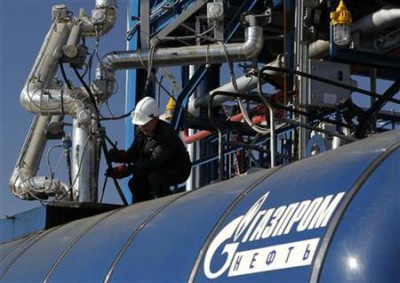Poland to use ‘all legal means’ to block Gazprom's EU antitrust deal
WARSAW (Reuters) -- Poland aims to use "all legal means" to block the European Union's proposed terms for settling its antitrust investigation into Russian gas company Gazprom, the country's foreign minister said on Wednesday.
 |
| Photo Courtesy of Reuters. |
EU competition regulators said on Monday that concessions made by Gazprom following charges that it has abused its dominant position in central and eastern European gas supply markets should ease concerns of market abuse, while Poland and other eastern EU countries wanted a tougher line taken by Brussels.
If it comes into force, the legally-binding deal would entail Gazprom doing away with supply terms which bar importing countries from re-exporting its gas to other countries, tying contracts to investments in pipelines, and making its pricing fairer in supplying the three Baltic states, Bulgaria and Poland, where currently there is little competition.
Poland's Foreign Minister Witold Waszczykowski reiterated that Warsaw has always been opposed to Gazprom gaining a greater share of the European gas market.
"We believe that the Russians will use their supplies as an instrument of political influence," Waszczykowski told reporters at a joint news conference with his Ukrainian counterpart, Pavlo Klimkin.
"It's a pity that our idea has not found an understanding in the European Commission," he said, referring to Poland's own proposals for a settlement with Gazprom.
He declined to say what those proposals are but said Poland and Ukraine, which has not bought gas from Russia for more than a year because of a political stand-off with Moscow, "will use all legal means, international courts, to present our view on this political project."
Poland imports most of its gas from Russia, but Waszczykowski said his country is working on freeing itself from its dependency within five years.
On Tuesday Poland's state-run gas company PGNiG said it was confident that a new pipeline system to import gas from Norway via Denmark and the Baltic Sea would be ready by 2022.
Poland and seven other states in the region affected by the case have until May 4 to object to the European Commission's view and seek changes to the deal.
Piotr Wozniak, chief executive of PGNiG, said that his firm was not satisfied with Gazprom's concessions and that the Commission had not dealt adequately with what he said were the Russian company's monopolistic practices.
"We are not satisfied with that. We have seven weeks to react," Wozniak said.
Ukraine's state energy company Naftogaz is also seeking to join PGNiG in a court case challenging the EU's decision to give Gazprom more capacity in the Opal gas pipeline in Germany.
Poland is fighting the EU's approval of a deal giving Gazprom access to more than its 50% share of Opal's capacity, which is expected to enable Russia to eventually bypass Ukraine as a gas export route by expanding its capacity to export into Europe via the Baltic Sea and Opal instead.
The EU, Klimkin said, "should ask itself a question. Does it want to be dependent on a country, and Gazprom is a part of Russia, whom no one trusts?"
Reporting by Lidia Kelly and Agnieszka Barteczko; Editing by Greg Mahlich

- RWE strengthens partnerships with ADNOC and Masdar to enhance energy security in Germany and Europe
- TotalEnergies and Mozambique announce the full restart of the $20-B Mozambique LNG project
- Venture Global wins LNG arbitration case brought by Spain's Repsol
- Mitsubishi Heavy Industries Compressor acquires Swiss rotating equipment maintenance company AST Turbo AG
- KBR awarded FEED for Coastal Bend LNG project



Comments